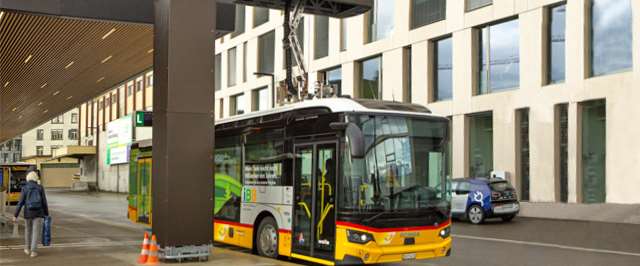On the road in an electric bus
In Brugg and elsewhere, PostBus is increasingly on the roads with vehicles powered by the sun. From 2040, PostBus plans to run its entire fleet of over 2,400 vehicles on fossil-free fuels. As part of a roadshow in 2021, PostBus tested how its commitment to climate-friendly mobility is being received by drivers and passengers.
For 152 days from March to July, there was plenty happening at a roadshow featuring an electric bus: PostBus took to the road with a rented eCitaro in Bellinzona, Interlaken, Glarus, Engelburg, Wohlen in Aargau, Delémont and Moudon. The drivers familiarized themselves with the new technology in service on the routes and at specially organized events. Almost without exception, they were impressed by the qualities of the vehicle – especially as the predicted range of 150 kilometres per battery charge was easily exceeded. The response from passengers was positive. “The fact that the electric bus is not only cleaner but also quieter than a diesel vehicle is a good argument in its favour in densely populated conurbations,” says Eveline Wüest, who is responsible for the procurement of alternative drive systems at PostBus. “We were able to show that electromobility in public transport works well. What we now have to do is convince policymakers and purchasers that the transformation from diesel vehicles to alternative drive systems in public transport will only succeed if we work together.” PostBus plans to bring 100 electric buses into operation by the end of 2024 and to convert the entire fleet by 2040.
Eveline Wüest Head of Alternative Drive Systems at PostBusBy 2040, the entire PostBus fleet will run on fossil-free fuels.
New charging strategy in Brugg
At present, there are five electric buses in use at PostBus. The latest project is an electric bus in Brugg in the Canton of Aargau, which is charged while out and about using a so-called pantograph at the train station. The energy is supplied by solar cells installed on the roof of the PostBus stop at the station. “This means that we don’t have to install large infrastructures at the bus depot. Instead, we use the stopping time to charge the battery,” explains Eveline Wüest. “That also reduces the workload for our drivers.” PostBus intends to make greater use of charging stations of this kind in the future.
